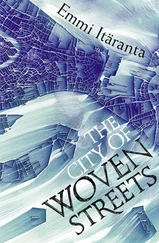A path ran along the border of the boulder garden, and my father turned to it. On this side the slope of the fell was full of caves. I had often come here to play when I was younger. I still remembered when my mother had once found me here playing mountain trolls with Sanja and a couple of other kids. She had yelled at my father, who had forgotten to look after me, and dragged me by the arm all the way home. I wasn’t allowed to play with the children from the village for a month. But even after that I had sneaked to the caves with Sanja whenever my mother was on research trips, and we had played explorers and adventurers and secret agents from New Qian in the Mediterranean Desert. There were dozens of caves, if not hundreds, and we had explored them as thoroughly as we thought possible. We had kept looking for secret passageways and hidden treasures, the kind you’d read about in old books or pod-stories, but never found anything more than coarse, dry stone.
My father stopped outside the mouth of a cave that was shaped like a cat’s head, and then passed through it without a word. The entrance was low. My knees rubbed against the rock through the thin fabric of my trousers, and I had trouble bringing the lantern and the insect hood in with me. Inside the cave the air was cool and still. The lanterns began to glow faintly as the yellowish glint of the blazeflies grew in the twilight.
I recognised the cave. We had fought about it one summer with Sanja, when she had wanted to use it for the headquarters of the Central And Crucially Important Explorers’ Society of New Qian. I had insisted that there was too much wasted space, because the cave grew steeply lower towards the back, and that it was too far from home for convenient smuggling of food. Eventually, we had opted for a smaller cave closer to my house.
My father was crawling towards the back of the cave. I saw him stop and push his hand right into the wall – so it seemed to me – and I saw the movement of his arm. The rock above him made a faint screeching sound as a dark hole opened in it. The cave was so low there that when he sat up, his head was already at the level of the hole, and he slipped through it, taking his lantern with him. Then I saw his face, when he looked at me through the hole.
‘Are you coming?’ he said.
I crawled to the back of the cave and felt the wall where I had seen him open the hatch. All I could see in the wavering light of the blaze lantern was the coarse rock, but then my fingers found a narrow shelf-like formation behind which there was a wide crack, and I discovered a small lever hidden in it. The crack was nearly impossible to see because of the way the rock was formed.
‘I’ll explain later how it all works,’ my father said. ‘Now come here.’
I followed him through the hatch.
Above the cave there was another one, or rather a tunnel which seemed to plunge right into the heart of the fell. On the ceiling, right above the hatch, there was a metal pipe and a large hook next to it. I had no idea what they were for. On the wall were two levers. My father turned one of them, and the hatch closed. The glow of the lanterns grew bright in the complete darkness of the tunnel. My father removed his insect hood and the waterskin he had been carrying and placed them on the floor.
‘You can leave your hood here,’ he said. ‘You won’t need it further ahead.’
The tunnel descended towards the inside of the fell. I noticed that the metal pipe ran along its length. I had no space to walk with my back straight, and my father’s head brushed the ceiling at times. The rock under our feet was unexpectedly smooth. The light of my lantern clung to the creases on the back of my father’s jacket and the darkness clung to the dents in the walls. I listened to the silence of the earth around us, different from the silence above the ground: denser, stiller. And slowly I began to distinguish a stretching, growing sound at its core, familiar and yet strange. I had never before heard it flowing free, entirely pushed by its own weight and will. It was akin to sounds like rain knuckling the windows or bathwater poured on the roots of the pine trees, but this sound wasn’t tame or narrow, not chained in man-made confines. It wrapped me and pulled me in, until it was close as the walls, close as the dark.
My father stopped and I saw in the lantern light that we had come to an opening between the tunnel and another cave. The sound thrummed loud. He turned to look at me. The light of the blazeflies wavered on his face like on water, and the darkness sang behind him. I expected him to say something, but he simply turned his back on me and went through the opening. I followed.
I tried to see ahead, but the glow of the lanterns did not reach far. The darkness received us with a rumble. It was like the roar of heated water at the bottom of an iron cauldron, but more like the sound of a thousand or ten thousand cauldrons when the water has just begun to boil and the tea master knows it’s time to remove it from the fire, or it will vanish as steam where it can no longer be caught. I felt something cool and moist on my face. Then we walked a few steps down, and the light of the blazeflies finally hit the sound, and I saw the hidden spring for the first time.
Water rushed from inside the rock in strings and threads and strands of shimmer, in enormous sheets that shattered the surface of the pond at the bottom of the cave when they hit it. It twisted around the rocks and curled in spirals and whirls around itself, and churned and danced and unravelled again. The surface trembled under the force of the movement. A narrow stream flowed from the pond towards the shelf of stone that the doorway we had come through was on, then disappeared into the ground under it. I could see something that looked like a white stain on the rock wall above the surface of the water, and another lever in the wall further away. My father urged me on, to the edge of the pond.
‘Try it,’ he said.
I dipped my fingers in the water and felt its strength. It moved against my hand like breathing, like an animal, like another person’s skin. It was cold, far colder than anything I was used to. I licked my fingers carefully, like I had been taught to do since I was very young: never drink water you haven’t tasted first.
‘It’s fresh,’ I said.
Lantern light folded on his face when he smiled, and then, slowly, the smile ran dry.
‘You’re seventeen, and of age now, and therefore old enough to understand what I’m going to tell you,’ my father said. ‘This place doesn’t exist. This spring dried a long time ago. So the stories tell, and so believe even those who know other stories, tales of a spring in the fell that once provided water for the whole village. Remember. This spring doesn’t exist.’
‘I’ll remember,’ I told him, but didn’t realise until later what kind of a promise I had made. Silence is not empty or immaterial, and it is not needed to chain tame things. It often guards powers strong enough to shatter everything.
We returned through the tunnel. When we came to the entrance, my father picked up the waterskin he had left there and hung it from the hook on the ceiling. After making sure that the mouth of the skin was open, he turned one of the levers on the wall. I heard an electric noise, similar to the noises the cooling appliances in our kitchen made, and a roar yet different from before, as if captured in metal. In a moment a strong jet of water burst from the ceiling straight into the waterskin.
‘Did you make all this?’ I asked. ‘Or mother? Did she plan this? Did you build this together?’
‘Nobody knows for certain who built this,’ my father said. ‘But tea masters have always believed it was one of them, perhaps the first one who settled here, before winters disappeared and these wars began. Now only the water remembers.’
Читать дальше
Конец ознакомительного отрывка
Купить книгу












